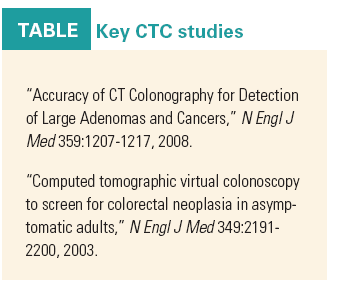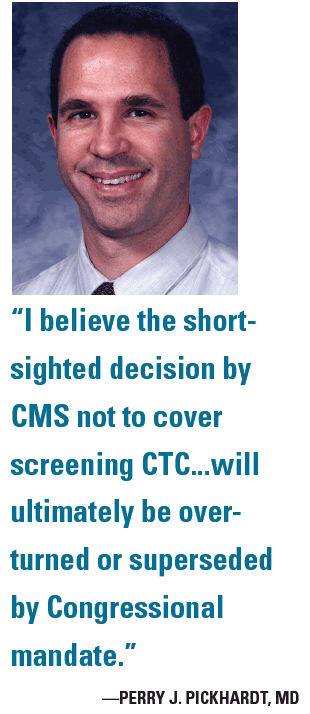CMS nixes CT colonography screening
Bucking the tide of medical professional opinion, CMS decided against granting payment for CT colonography as a screening test for colorectal cancer. CMS ruled that the clinical evidence remains inadequate to conclude that CTC is appropriate for that role.
Bucking the tide of medical professional opinion, CMS decided against granting payment for CT colonography as a screening test for colorectal cancer. CMS ruled that the clinical evidence remains inadequate to conclude that CTC is appropriate for that role.

The final coverage decision reflected objections that CMS raised in February when it proposed withholding reimbursement for CTC as an alternative to invasive optical colonoscopy for colon cancer screening.
It also falls in line with a 2008 recommendation by the influential U.S. Preventive Services Task Force. It concluded that evidence was insufficient to assess the benefits and harms of CTC as a screening modality for colorectal cancer.
Included among professional groups that opposed holding back on reimbursement are the American Cancer Society, American College of Radiology, American Gastroenterological Association, and UnitedHealthcare.

In an e-mail response to the decision, Perry J. Pickhardt, MD, a radiologist who led one of the two key trials testing CTC, said the decision was not surprising. “CMS seemed oblivious to the facts in this case, not to mention the clear support from the American Cancer Society, AGA, ACR, and Congress,” he said. Asked how this decision will affect cancer specialists, Dr. Pickhardt told Oncology News International that “in the short term, cancer care specialists will, unfortunately, continue to see many patients presenting with advanced symptomatic CRC simply because screening rates continue to be dismal.”
But Dr. Pickhardt does predict better news for CTC in the future. “I believe the shortsighted decision by CMS not to cover screening CTC...will ultimately be overturned or superseded by Congressional mandate. In the end, all adults 50 and older would greatly benefit from having more effective and less invasive options to choose from.”
Organizations supporting CMS’ decision against reimbursement included the American College of Gastroenterology, American College of Preventive Medicine, American Society for Gastrointestinal Endoscopy, and America’s Health Insurance Plans.
John L. Petrini, MD, president of the American Society for Gastrointestinal Endoscopy, a professional society representing 10,000 gastroenterologists, urged CMS to stick with its proposed rejection of reimbursement for colonography. Dr. Petrini argued that reimbursement would be premature because CTC falls short of the agency’s evidence-based criteria for approval and that landmark trials were performed on patients who were too young to qualify for Medicare (see Table on page 24).
In the final decision, CMS cited six external technology assessments, including a 2008 USPSTF review. Six internal technology assessments included two seminal studies that CTC supporters believe provide definitive evidence of CTC’s ability to screen for colorectal cancer.
Oncology Peer Review On-The-Go: Cancer Care Management During the COVID-19 Pandemic
October 28th 2020The newest episode of Oncology Peer Review On-The-Go speaks with 2 authors of an article from the October Issue of the journal ONCOLOGY focusing on effective cancer care management during the coronavirus pandemic.